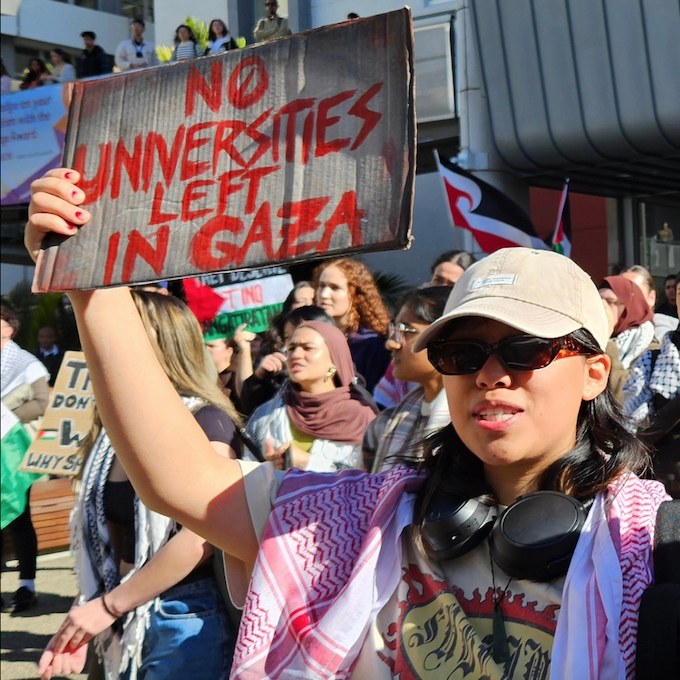
COMMENTARY: By John Hobbs
The New Zealand government remains disturbingly quiet on the unfolding genocide in Gaza.
New Zealand’s silence is clearly undermining its self-image as a principled and independent state within the United Nations. It is following its Anglosphere English-speaking partners (United States, UK, Canada, and Australia) in avoiding putting in place any sanctions against Israel — as has been done with Russia — in response to its invasion of Ukraine.
Not only is New Zealand doing nothing to influence Israel to stop its slaughter of Palestinian children and civilians, New Zealand is at risk of being seen to be complicit in a genocide. New Zealand, as a contracting party to the UN Convention on Genocide, has a responsibility under the convention.
- READ MORE: At least 25 killed in Israeli strikes on Gaza today, including infant
- ‘Traumatised, exhausted’: 1 million ‘trapped’ as south Gaza war rages – World Food Programme
- Other War on Gaza reports
It is doubtful that New Zealand’s “performance” in the UN General Assembly (UNGA), where it typically votes the “right way”, supporting a ceasefire and Palestinian membership of the UN, provides a get out of jail card for New Zealand vis-a-vis its responsibilities under the convention.
That the New Zealand government is ignoring the spate of decisions by UN international bodies calling out Israel for contravening international humanitarian and criminal law is, if anything, puzzling.
These bodies are the guardians of the international rule of law. Member states of the UN are obliged to support their decisions actively, not just in voice, and again, New Zealand’s rhetoric historically is that it supports the international rule of law.
The International Court of Justice (ICJ) deemed that a probable genocide is occurring in Gaza and has recently called for an immediate ceasefire in Rafah. The International Criminal Court (ICC) has recommended that Prime Minister Benjamin Netanyahu and Defence Minister Yoav Gallant be held criminally liable for the act of starvation inflicted against the Palestinian people.
New Zealand also stubbornly refuses to recognise Palestinian statehood, even though it has been argued by successive New Zealand governments, since 1993, that it supports the Oslo Accords and its key feature, the two-state solution.
This positioning has always provided a convenient smoke screen for New Zealand to appear to be supportive of an independent Palestinian state but in reality successive New Zealand governments have shown no real interest in doing so.
Importantly, New Zealand fails to distinguish between Israel as the occupier of Palestinian land and the Palestinians as the occupied people. Given this inequivalence, the New Zealand rhetoric of “leaving it to the parties” to agree what Palestinian state arrangements and borders might look like is laughable, if it wasn’t so cruel.
There are now more than 700,000 Israeli illegal citizens which have been illegally transferred (settled) by Israel to the Occupied Territories — which under a two-state solution would be a future Palestinian state. This area is tiny, only about half the size of the area of Auckland (which is about 5600 sqkm.) It makes the task of an independent and sovereign Palestinian state near impossible to achieve.
The illegal transfer of Israeli citizens on to Palestinian land in the Occupied West Bank has a clear purpose — to transfer Palestinians off their land.
By remaining quiet the New Zealand government is effectively ignoring the rules-based order which it has historically argued it bases its foreign policy decision-making on. Indeed, this shift or “reset” in New Zealand foreign policy was intimated by the Minister of Foreign Affairs, Winton Peters, in a recent speech to the NZ Institute of International Affairs.
Aware of the growing criticism of the lack of independence in New Zealand foreign policy, the minister stated that “New Zealand’s independent foreign policy does not, and never has, meant we are a non-aligned nation, although that is the way some critics in politics and the media see us . . . We take the world as it is, and this realism is a shift from our predecessors’ vaguer notions of an indigenous foreign policy that no-one else understood, let alone shared.”
This is clearly a move to a more “realpolitik” approach to international relations, where New Zealand’s “interests” are paramount. Our values are clearly a secondary consideration, and it is only by good luck that our interests and values might align.
As a recent Palestinian speaker in New Zealand, Professor Mazim Qumsiyeh, so rightly put it, “in the end we will not remember the words of our enemies but we will remember the silence of our friends.” Accordingly, New Zealand must employ all of its endeavours to place real pressure on Israel to stop its genocidal attack on the Palestinian people now.
It only needs to look to its Ukrainian/Russian playbook, to begin to do the right thing.
John Hobbs is a doctoral candidate at the National Centre for Peace and Conflict Studies (NCPCS), University of Otago.











































